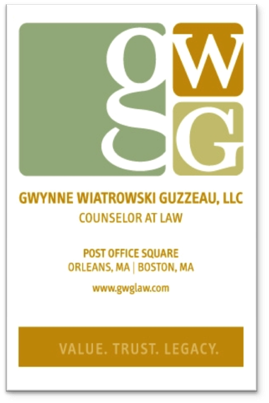Back to Basics
by Gwynne Wiatrowski Guzzeau
Welcome to 2011, the year you'll get your legal house in order. Yes, Y-O-U! And I'll be here to help with information and resources to guide you step by step through a process most people prefer to put off to another day: planning your estate.
Now you might be thinking, "What estate?" And in this economy you are not alone. While the year end news was filled with stories of tax cuts for the rich, most of us were checking our bank balances or credit limits to determine if we could stretch for just one more gift to give or one more bill to pay.
The fact is that an estate plan is about more than money. An estate plan is a set of legal documents and directions that accomplish two goals:
One, to provide for your care when you are no longer able to do so; and
Two, to distribute any remaining assets to the beneficiaries you name.
So while you're still alive, let's get started. There are two legal documents that every adult should have prepared in the event of disability.
- Durable Power of Attorney: The most powerful document that you will probably ever sign, this legal instrument grants broad powers to your appointed agent to act on your behalf regarding your property and business affairs.
While many people cringe when they think about giving control of their assets to another person, this document can be drafted to curtail certain powers and require certain actions before your agent can act on your behalf. This document is only effective while you are alive and it cannot be used to transfer any assets after your death.
Under the recently adopted Massachusetts Uniform Probate Code, your Power of Attorney should identify the person you want to serve for you as a Guardian or Conservator in the event that a court ever needs to appoint someone to take full control of your person and/or assets. - Health Care Proxy: This document grants your agent the authority to make health care decisions only after a doctor has determined that you are no longer able to make such decisions.
Estate lawyer Gwynne Waitrowski Guzzeau brings some legal ease to the ever-changing laws that are now going into effect.
- Your health care agent has the legal authority to make any and all medical decisions, including end-of-life care decisions, if you cannot. Therefore, you may wish to include information about your wishes for end-of-life care or you might write a legacy letter or "living will" to express your desires.
Please note that a "living will" is not a legally enforceable document in the state of Massachusetts. Therefore, consider carefully how and what you wish to communicate to your agent so that she or he will carry out your desires for end of life care to the best of her or his ability.
Both of these documents should include provisions regarding your intent to waive any privacy rights so your agents can access your medical information under the HIPPA laws.
If your documents do not contain this waiver, you can complete a waiver with your primary care doctor indicating that you grant your agents access to your medical information.
While your Health Care Proxy & Durable Power of Attorney are the two most important documents to have in place in the event of disability, these documents serve only to appoint an agent to act on your behalf under specific statutory authority.
In other words, they do not provide instructions to your agents. Therefore, I constantly emphasize to my clients that these documents are only as good as the communication you have with your appointed agent about how you envision them acting on your behalf, if and when it's necessary.
Sounds complicated? I hope not. These documents can be accessed easily in our local community.
Health Care Proxy. You can get a copy of a standard form Massachusetts Health Care Proxy from your local council on aging.
You don't need a lawyer involved in the signing, you just need two witnesses who aren't also named as your health care agent to sign. You should give a copy to your agent and your primary care doctor.
If you have questions for Gwynne please email the Editor at CapeWomenOnline. You can visit Gwynne's website at www.gwglaw.com
Durable Power of Attorney. Our CLAMS library system has many titles regarding do-it-yourself estate planning. In particular, you can search the system for "NOLO" publications that include a CD with sample forms for you to complete yourself.
One of my favorite NOLO publications is 101 Law Forms For Personal Use, although you'll find a number of estate planning titles, as well.
Well there you have it. Homework. Of course, you may have some questions. If so, send them to the editor of CapeWomenOnline and I'll do my best to respond in my next column, which will discuss the Last Will and Testament as a central component of your estate plan.
Thanks for reading and remember, meeting with an estate-planning attorney is the best way to ensure that your documents fit your circumstances.
The information in this column is not intended to be legal advice, rather it is offered for informational purposes.
Gwynne Wiatrowski Guzzeau is a lawyer and entrepreneur. She lives with her family in Orleans.
 |

